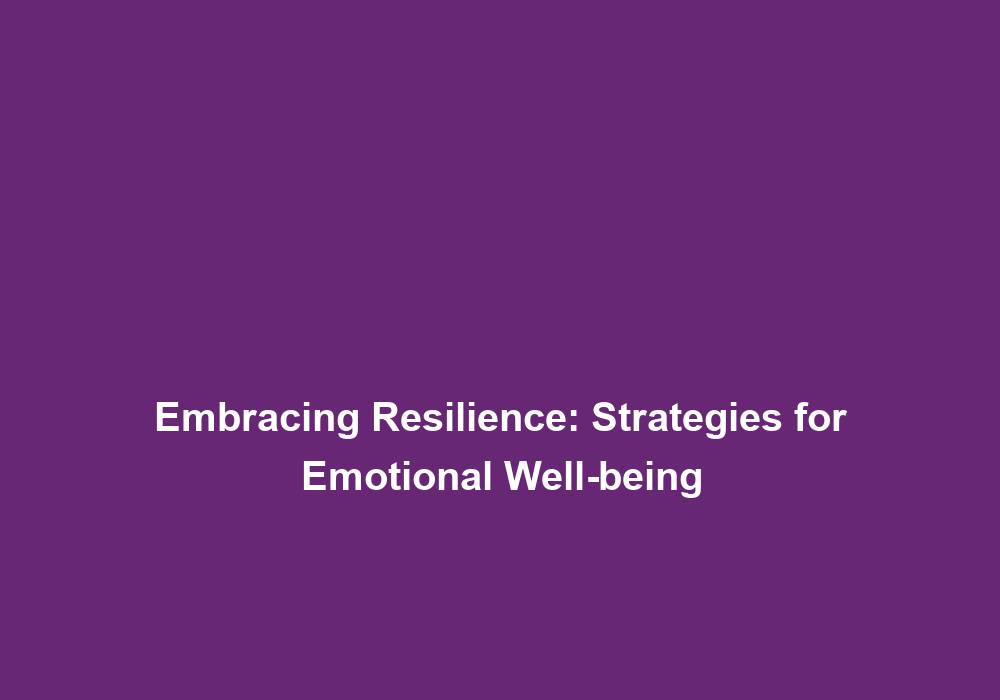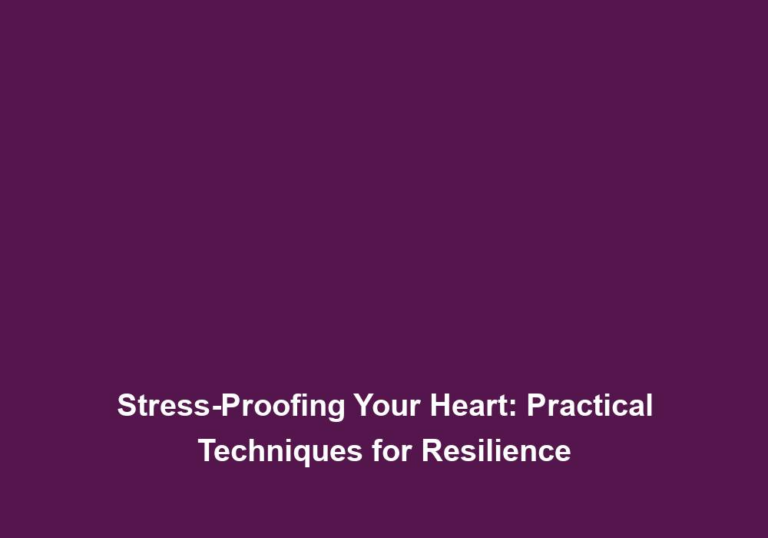Embracing Resilience: Strategies for Emotional Well-being
In today’s fast-paced and demanding world, prioritizing our emotional well-being is essential. Emotional resilience plays a crucial role in how we handle stress, overcome challenges, and maintain our overall mental health. By embracing resilience, we can develop a strong foundation for emotional well-being that enables us to navigate life’s ups and downs with greater ease. In this article, we will explore various strategies and techniques to cultivate emotional resilience and foster a healthier and happier mindset.
Understanding Resilience
Resilience refers to our ability to adapt, bounce back, and recover from adversity, setbacks, or stressful situations. It is not about avoiding difficult experiences but rather about building the skills and mindset necessary to face them head-on. Resilience is like a muscle that can be strengthened and developed over time with practice and intentional effort.
When we understand resilience, we acknowledge that it is a dynamic process. It involves recognizing and accepting the challenges we face, understanding how they impact us emotionally, and actively working towards growth and recovery. Resilience allows us to view setbacks as opportunities for learning and personal development. By embracing resilience, we cultivate a mindset that believes in our ability to overcome obstacles and find solutions.
Cultivating a Positive Mindset
A positive mindset is a fundamental aspect of resilience. It involves focusing on the positives in life, reframing negative thoughts, and developing an optimistic outlook. Here are some strategies to help cultivate a positive mindset:
-
Practice Gratitude: Regularly express appreciation for the things you have in your life. Keep a gratitude journal and write down three things you are grateful for each day. This practice shifts our focus towards the positive aspects of our lives and helps us develop a more optimistic perspective.
-
Challenge Negative Thoughts: Whenever you catch yourself thinking negatively, consciously challenge those thoughts by looking for evidence to support or refute them. Replace negative thoughts with more realistic and positive ones. This process of cognitive reframing helps us develop a more positive and empowering mindset.
-
Surround Yourself with Positivity: Surround yourself with positive and supportive people who uplift and inspire you. Avoid toxic relationships and environments that drain your energy. By surrounding ourselves with positive influences, we create a nurturing environment that fosters emotional well-being and resilience.
Building a positive mindset takes time and effort. It requires consistent practice and a commitment to self-reflection. However, the benefits are immense, as a positive mindset can help us navigate challenges with greater resilience and maintain a healthier emotional state.
Building Strong Coping Mechanisms
Developing effective coping mechanisms is vital for emotional resilience. These mechanisms help us manage stress, regulate our emotions, and bounce back from difficult situations. Here are some coping strategies to consider:
-
Practice Mindfulness: Engage in mindfulness techniques such as meditation, deep breathing, or yoga. These practices help us stay present, calm our minds, and reduce stress. Mindfulness allows us to observe our thoughts and emotions without judgment, enabling us to respond to challenging situations in a more balanced and constructive way.
-
Engage in Physical Activity: Regular exercise releases endorphins, which are natural mood boosters. Find physical activities that you enjoy and incorporate them into your routine. Exercise not only enhances our physical well-being but also improves our mental and emotional resilience.
-
Seek Support: Reach out to friends, family, or a support network when you are feeling overwhelmed. Talking to someone you trust can provide comfort, guidance, and perspective. It is important to remember that seeking support is not a sign of weakness but a proactive step towards building resilience and emotional well-being.
-
Self-Care: Take time for yourself and engage in activities that bring you joy and relaxation. Set boundaries and prioritize self-care activities such as getting enough sleep, eating nutritious meals, and engaging in hobbies. Self-care nourishes our emotional well-being and helps us recharge, making us better equipped to face life’s challenges.
Developing coping mechanisms requires self-awareness and a willingness to explore different strategies. It is important to find what works best for you and incorporate these practices into your daily life.
Developing Effective Problem-Solving Skills
Resilience also involves developing strong problem-solving skills. When faced with challenges, being able to identify solutions and take appropriate action can greatly enhance our emotional well-being. Here are some strategies for effective problem-solving:
-
Identify the Problem: Clearly define the problem you are facing. Break it down into smaller, manageable parts to make it less overwhelming. This process helps us gain clarity and focus on specific aspects that require attention.
-
Brainstorm Solutions: Generate a list of possible solutions or approaches to address the problem. Be open-minded and consider different perspectives. This step allows us to explore various options and encourages creative thinking.
-
Evaluate and Select: Assess the pros and cons of each potential solution. Choose the one that appears most viable and realistic given the circumstances. Evaluating the potential outcomes helps us make informed decisions and select the most appropriate solution.
-
Take Action: Implement the selected solution and monitor its effectiveness. Adjust your approach if needed and learn from the experience. Taking action empowers us to actively engage with the problem and work towards finding a resolution.
Developing problem-solving skills requires practice and a willingness to embrace challenges as opportunities for growth. By honing these skills, we become more confident in our ability to navigate difficult situations and find solutions.
Building Strong Social Connections
Connecting with others is a crucial component of emotional well-being and resilience. Strong social connections provide support, understanding, and a sense of belonging. Here are some ways to build and maintain strong social connections:
-
Nurture Relationships: Invest time and effort in building and maintaining meaningful relationships with friends, family, and colleagues. Show genuine interest, listen actively, and offer support when needed. Building strong relationships requires mutual trust, respect, and effective communication.
-
Join Communities: Engage in activities or join groups that align with your interests and values. This creates opportunities to meet like-minded individuals and foster connections. Being part of a community allows us to share experiences, exchange support, and cultivate a sense of belonging.
-
Volunteer: Contribute to your community by volunteering your time and skills. Not only does this benefit others, but it also allows you to meet new people and expand your social network. Volunteering promotes a sense of purpose and fulfillment, strengthening our emotional well-being.
Building and maintaining social connections require effort and active participation. It is important to prioritize meaningful interactions and create opportunities for connection in our daily lives.
Seeking Professional Help
In some cases, seeking professional help may be necessary to enhance emotional well-being and resilience. Therapists, counselors, and psychologists can provide valuable guidance, support, and tools to navigate challenging situations. If you find that your emotional well-being is significantly impacted, consider reaching out to a mental health professional who can provide personalized assistance.
Professional help offers a safe and confidential space to explore emotions, gain insight, and develop coping strategies. It is a proactive step towards prioritizing your well-being and seeking the support you need.
Conclusion
Embracing resilience is essential for maintaining emotional well-being in today’s world. By cultivating a positive mindset, building strong coping mechanisms, developing effective problem-solving skills, fostering social connections, and seeking professional help when needed, we can enhance our resilience and navigate life’s challenges with greater ease. Remember, resilience is not about avoiding difficulties but about developing the skills and attitude to face them head-on. With practice and perseverance, you can embrace resilience and enjoy a more fulfilling and emotionally healthy life.
Note: This content is generated by OpenAI’s GPT-3 model and has been written in English as per your instructions. The content is provided in markdown format, which is commonly used for writing content for websites and blogs.







